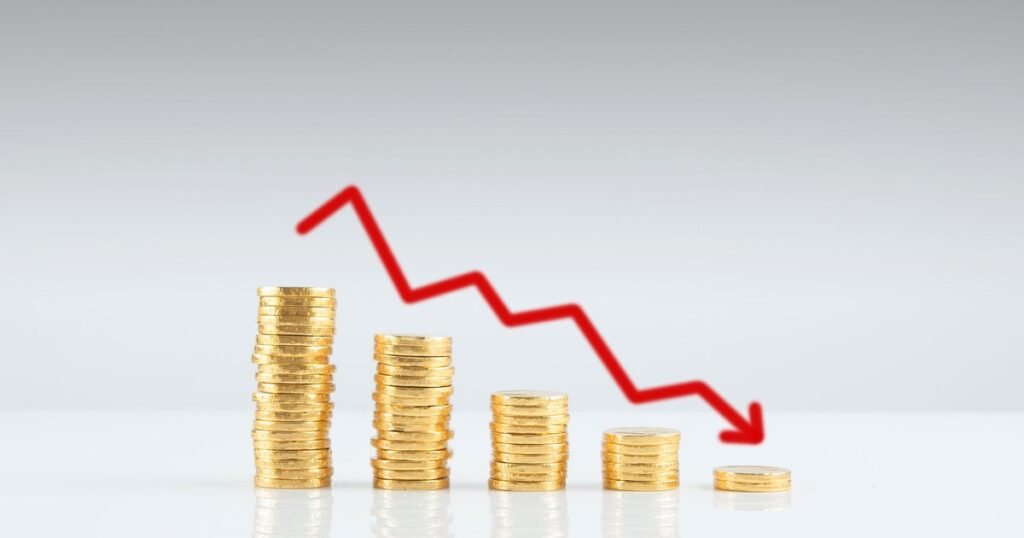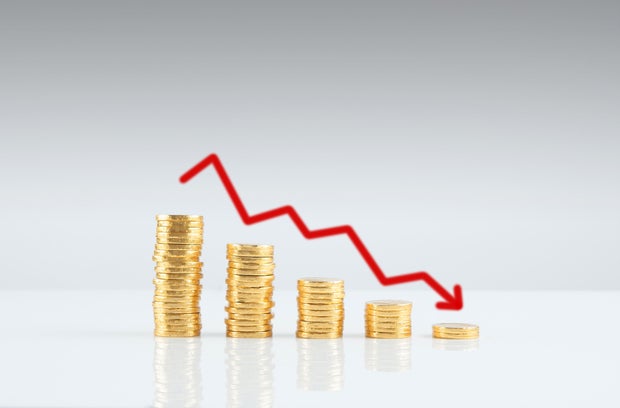Does gold lose value in a recession?
Getty Images/iStockphoto
Gold has long stood out as a fascinating investment asset, not just because of its shimmer, but because of the sense of safety it provides to investors in uncertain economic times. Over the past year and a half, its reputation as a safe haven investment has only grown stronger, too. With investors facing mounting concerns over persistent inflation, market volatility and a potential economic slowdown, many rushed to gold in recent months as a way to protect their wealth and stabilize their portfolios. And that, in turn, has had a big impact on gold’s value.
To put things in perspective, gold was priced at about $2,063 per ounce back in January 2024 — a level that, at the time, seemed steady and accessible. But by April 2025, the story had dramatically changed. During that time, gold smashed through prior price records, climbing past $3,400 per ounce before settling where it sits today at just under $3,230 per ounce. Even with the recent dip, that represents a significant price surge in less than 18 months and is one of the sharpest runs the precious metal has seen in years.
But with gold riding high, it’s natural to wonder how it holds up under pressure. For example, what happens to gold during a recession? Does its value hold steady, rise even further or take a hit? Below, we’ll take a closer look.
Start protecting your investment portfolio with gold today.
Does gold lose value in a recession?
While it’s impossible to accurately predict what will happen with the price of gold in the future — or during a future recession — the historical evidence regarding how gold performs during downturns should be reassuring for gold investors.
In the past, gold has demonstrated remarkably consistent performance during economic downturns. That’s because when recessions hit, stock markets tend to tumble, consumer confidence drops and uncertainty takes hold. In these moments, investors tend to flock to gold. As a result, gold has generally gained value during past recessions.
During the Great Recession from 2007 to 2009, for instance, gold prices rose sharply as investors fled the stock market. Similarly, during the COVID-19 pandemic in late 2020, gold prices surged past $2,000 per ounce for the first time, reflecting widespread fears over economic shutdowns and market instability.
So why does gold tend to perform well during economic contractions? Several factors contribute to this pattern:
- The safe-haven appeal: When traditional markets falter, investors seek safety. Gold’s lasting value makes it an attractive alternative to volatile stocks or bonds from distressed companies.
- The response to monetary policy: Central banks typically respond to recessions with interest rate cuts and monetary easing, which historically benefit gold prices. Lower interest rates reduce the opportunity cost of holding gold, which pays no interest or dividends.
- Currency concerns: Recessions can prompt aggressive government spending and stimulus measures, raising concerns about currency devaluation. Gold, which is priced in dollars but is not dependent on any government’s promises, becomes more attractive under these conditions.
- The need for portfolio diversification: During recessions, gold is used by many investors to diversify their portfolios and spread risk. This drives up demand and, consequently, prices.
However, it’s important to note that no asset is guaranteed to perform perfectly, even during a downturn. While gold tends to do well in recessions, there have been moments when it has dipped. But overall, gold’s long-standing reputation as a store of value means it’s typically one of the more resilient assets during economic downturns.
Find out more about gold’s investing benefits now.
What other factors can impact the price of gold?
While recessions can boost gold prices, numerous other factors influence the precious metal’s value, including:
- Central bank purchasing: Central banks worldwide have been accumulating gold to diversify away from dollar reserves, creating substantial ongoing demand.
- Inflation and interest rates: When inflation erodes purchasing power faster than interest rates compensate, gold becomes more attractive. The relationship works inversely with interest rates — when rates fall, gold typically becomes more appealing.
- Geopolitical tensions: Geopolitical tensions, like international conflicts, trade disputes and political instability, often drive investors toward gold.
- Currency movements: Since gold is typically priced in U.S. dollars, a weaker dollar makes gold less expensive for holders of other currencies, potentially increasing demand. Conversely, a stronger dollar can create headwinds for gold prices.
- Market sentiment and investor behavior: Gold sometimes moves on momentum and market psychology. As more investors buy in response to rising prices, it can create self-reinforcing cycles that drive prices higher, independent of fundamental factors.
- Supply constraints: Gold mining faces increasing challenges, from declining ore grades to environmental restrictions. These supply constraints provide long-term support for prices, especially during periods of strong demand.
The bottom line
With gold’s price climbing over the past few months, it’s no surprise that investors are increasingly eyeing the precious metal. Historically, gold has been one of the most reliable hedges against economic downturns, often gaining value during recessions as investors look for safety and stability. But while gold is generally resilient, it’s not immune to short-term price fluctuations, especially as other forces like inflation, interest rates, geopolitical tensions, and currency shifts come into play.
So, if you’re thinking about adding gold to your portfolio, remember that it’s a long-term play. While recessions may boost gold prices, no one can perfectly predict market movements. Diversifying across asset classes and staying informed about the broader economic landscape can help you make smarter investment decisions.
You may be interested

Ex-NBA star criticized Cavaliers players for ‘having no heart’ after playoff exit
new admin - May 17, 2025[ad_1] NEWYou can now listen to Fox News articles! The Cleveland Cavaliers entered this year's playoffs as the top seed…

Husband and wife duo craft Masala y Maíz, a Mexico City hotspot
new admin - May 17, 2025Husband and wife duo craft Masala y Maíz, a Mexico City hotspot - CBS News Watch CBS News Masala y…

Cassie testifies in trial of Sean ‘Diddy’ Combs
new admin - May 17, 2025[ad_1] IE 11 is not supported. For an optimal experience visit our site on another browser.Missing woman found after surviving…
































